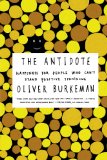Summary | Excerpt | Reading Guide | Reviews | Beyond the Book | Readalikes | Genres & Themes | Author Bio

Critics' Opinion:
Readers' Opinion:
First Published:
Nov 2012, 256 pages
Paperback:
Nov 2013, 256 pages
 Book Reviewed by:
Book Reviewed by:
Stacey Brownlie
Buy This Book
These days, this notion certainly gets less press than the admonition to remain positive at all times. But it is a viewpoint with a surprisingly long and respectable history. You'll find it in the works of the Stoic philosophers of ancient Greece and Rome, who emphasised the benefits of always contemplating how badly things might go. It lies deep near the core of Buddhism, which counsels that true security lies in the unrestrained embrace of insecurity – in the recognition that we never really stand on solid ground, and never can. It underpins the medieval tradition of memento mori, which celebrated the life-giving benefits of never forgetting about death. And it is what connects New Age writers, such as the bestselling spiritual teacher Eckhart Tolle, with more mainstream recent work in cognitive psychology on the self-defeating nature of positive thinking. This same 'negative' approach to happiness also helps explain why so many people find mindfulness meditation so beneficial; why a new generation of business thinkers are advising companies to drop their obsession with goalsetting and embrace uncertainty instead; and why, in recent years, some psychologists have reached the conclusion that pessimism may often be as healthy and productive as optimism.
At the bottom of all this lies the principle that the countercultural philosopher of the 1950s and '60s, Alan Watts, echoing Aldous Huxley, labelled 'the law of reversed effort', or the 'backwards law': the notion that in all sorts of contexts, from our personal lives to politics, all this trying to make everything right is a big part of what's wrong. Or, to quote Watts, that 'when you try to stay on the surface of the water, you sink; but when you try to sink, you float' and that 'insecurity is the result of trying to be secure'. In many cases, wrote Huxley, 'the harder we try with the conscious will to do something, the less we shall succeed'.
The negative path to happiness is not an argument for bloody-minded contrarianism at all costs: you won't do yourself any favours by walking into the path of oncoming buses, say, rather than trying to avoid them. Nor should it be taken as implying that there's necessarily anything wrong with optimism. A more useful way to think of it is as a much-needed counterweight to a culture fixated on the notion that optimism and positivity are the only possible paths to happiness. Of course, many of us are already healthily sceptical when it comes to positive thinking. But it is worth noting that even most people who disdain the 'cult of optimism', as the philosopher Peter Vernezze calls it, end up subtly endorsing it. They assume that since they cannot or will not subscribe to its ideology, their only alternative is to resign themselves to gloom, or a sort of ironic curmudgeonhood, instead. The 'negative path' is about rejecting this dichotomy, and seeking instead the happiness that arises through negativity, rather than trying to drown negativity out with relentless good cheer. If a fixation on positivity is the disease, this approach is the antidote.
This 'negative path', it should be emphasised, isn't one single, comprehensive, neatly packaged philosophy; the antidote is not a panacea. Part of the problem with positive thinking, and many related approaches to happiness, is exactly this desire to reduce big questions to one-size-fits-all self-help tricks or ten-point plans. By contrast, the negative path offers no such single solution. Some of its proponents stress embracing negative feelings and thoughts, while others might better be described as advocating indifference towards them. Some focus on radically unconventional techniques for pursuing happiness, while others point towards a different definition of happiness, or to abandoning the pursuit of it altogether. The word 'negative' often has a double meaning here, too. It can refer to unpleasant experiences and emotions; but some philosophies of happiness are best described as 'negative' because they involve developing skills of 'not doing' – of learning not to chase positive feelings so aggressively. There are many paradoxes here, and they only get deeper the more you probe. For example, is a feeling or a situation truly 'negative' if it leads ultimately to happiness? If 'being positive' doesn't make you happy, is it right to call it 'being positive' at all? If you redefine happiness to accommodate negativity, is it still happiness? And so on. None of these questions can be tidily resolved. This is partly because the proponents of the negative path share only a general way of seeing life, rather than a single strict set of beliefs. But it is also because one crucial foundation of their approach is precisely that happiness involves paradoxes; that there is no way to tie up all the loose ends, however desperately we might want to.
Excerpted from The Antidote by Oliver Burkeman. Copyright © 2012 by Oliver Burkeman. Excerpted by permission of Faber and Faber. All rights reserved. No part of this excerpt may be reproduced or reprinted without permission in writing from the publisher.





The Funeral Cryer by Wenyan Lu
Debut novelist Wenyan Lu brings us this witty yet profound story about one woman's midlife reawakening in contemporary rural China.
Your guide toexceptional books
BookBrowse seeks out and recommends the best in contemporary fiction and nonfiction—books that not only engage and entertain but also deepen our understanding of ourselves and the world around us.